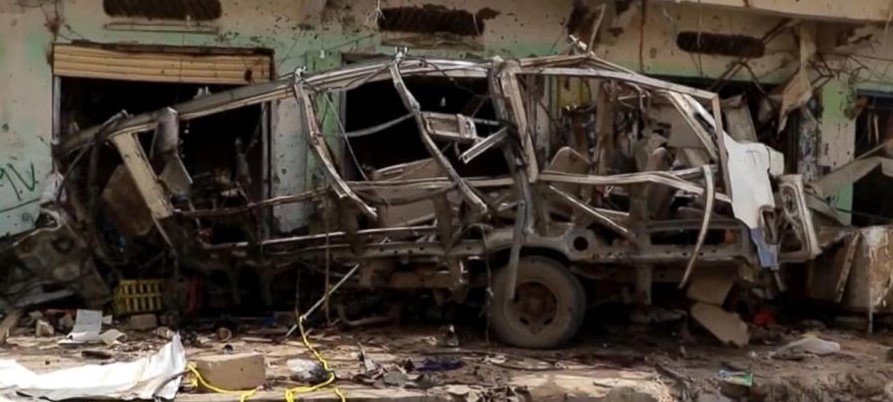12 July 2022 ~
I am very familiar with the challenges of providing humanitarian services in the field, having served on several missions in conflict regions. I go because once I see something… once I know something… I cannot unsee or unknow it. I cannot push it away. I go because there is human suffering. I know, also, that I am not alone. I have had the privilege to work alongside some of the bravest and most caring people I will ever know – and one of the bravest humanitarian leaders I know, is in a hospital bed right now fighting for his life, after being shot in an attack in Syria.
Humanitarians are not a target. That THAT needs to be said out loud is outrageous. Serving in the field, humanitarians risk much, to help ease the suffering of others. They leave their homes and families and they go where they are needed… and the need has increased. In brutal conflict and crisis situations, civilian populations find hope in the humanitarian and healthcare workers that come to help the the most vulnerable.
Humanitarian professionals are not combative troops, and they are not armed opposition, in fact, they are not armed at all. They cannot defend themselves and there is nothing they can do to protect themselves from an airstrike, shelling, or ground armament attack once it has been launched. Although they are legally protected under International Humanitarian Law, they often share their GPS coordinates with both sides of an armed conflict, to alert all warring parties of their presence in the area. The rationale for this is that if humanitarian workers and medical personnel are clear on their locations, they will not be attacked. Of course, that is not always the case.
There are widespread and severe consequences resulting from the violent and illegal acts that interfere with the delivery of aid and supplies, damage or destroy facilities and vehicles, and injure or kill workers and civilians. The lack of safe access to humanitarian assistance and healthcare in conflict or other emergencies affects millions of people. In the field, the effect of just one violent incident can be felt by hundreds or thousands. A single act of violence that damages a school, or hospital, or kills health workers, will deprive many of those services – and take the lives of all those caught in the violence.
But even conflict has universal rules and laws governing it, regardless of where the conflict occurs. The Geneva Conventions and their Additional Protocols, drafted by the International Committee of the Red Cross, outline the responsibilities that national governments and warring parties have to protect the lives and dignity of combatants and civilians, as well as humanitarian and healthcare workers during conflicts. The protections include the right to be treated humanely, to have access to food, water, shelter, medical treatment, and communications, and to be free from violence. The Geneva Conventions and its Protocols prohibit hostage-taking and humiliation or degrading treatment and prohibit collective punishment or imprisonment. In 2003, the UN Security Council passed Resolution 1502 giving greater protection to humanitarian workers and treating attacks on them as war crimes.
Afghanistan and Syria are two of the most dangerous countries for humanitarian workers to operate. Since 2010, abductions of humanitarian professionals have increased in both countries, in many cases with impunity. Workers may be targeted for political reasons both directly and by association. Sometimes an organization may be targeted for comments it has made, for a position it has taken, for something it has done, or for the help, it provides to the population – to whom others do not want to help. It can also be targeted for being perceived as associated with a particular group, government, or foreign power.
In Yemen, Houthi forces have chronically interfered with international aid organizations, jeopardizing efforts to assist millions of civilians caught in the world’s worst humanitarian crisis. Aid workers habitually face threats from Houthis, and several have been abducted. As the Houthis have continued to assert control, aid organizations have been forced to scale back on the delivery of humanitarian aid, medical supplies, education programs, and peace-building efforts.
In August 2018, an airstrike by the Saudi-led coalition bombed a school bus, killing forty children, ages six to eleven, and injuring fifty-six more children. The weapon turned out to have been supplied to the coalition from the US – which begs the question, should countries continue to supply or sell weapons to warring countries when human rights violations – war crimes – are being committed… and make no mistake… bombing a school bus filled with children is, by definition, a war crime.
The same coalition forces repeatedly targeted Doctors Without Borders (MSF) and the International Committee of the Red Cross (ICRC) and others in Yemen as health workers gave aid to the people.
In Mariupol Ukraine, Russian forces attacked a maternity hospital, killing five, injuring seventeen, and destroying ninety percent of the building. Within a few weeks, there were fifty-nine attacks on healthcare facilities in Ukraine. The combined criminal efforts of Russia and Syria know no boundary. In Ghouta, a neighborhood of Damascus, hundreds of civilians were killed when Russian and Syrian airstrikes used chemical weapons – also a war crime – with impunity. The attack was denied by Russian authorities and declared “fake news.”
Whether it is the coalition in Yemen, the Russians in Syria and Ukraine, or the military in Myanmar – nearly every aggressor denies killing civilians – despite a mountain of evidence to the contrary.
Attacks against humanitarian professionals are a major concern for international aid organizations. Compliance and respect for International Humanitarian Law are deteriorating and equally prevalent is the culture of impunity. International Humanitarian Law lacks effective enforcement mechanisms and without clear consequences or meaningful deterrence, attacks on civilian populations and relief workers that harm or kill will continue. Civilians, humanitarians, and healthcare workers make incredible sacrifices to help those in conflict and crisis. The pursuit of peaceful solutions to conflict, a commitment to uphold International Humanitarian Law, and assurance of the protection of civilians and humanitarian workers must be a priority. #ThinkingOutLoud #NotATarget #Humanitarians #CultureOfImpunity
With gratitude… Lara
Image: ‘713 School Bus Bombing’ by Felton Davis – Saudi-led Coalition Airstrike Kills Dozens of Children on Bus in Yemen.
Not a Target


Thanks for posting this Lara… NO, we are not targets. Children are not targets. Workers are not targets. Civilians are not targets. And to target them is a #warcrime.
As I read your informative posts, Lara, my heart aches for the brave, the innocents, the hurting masses. To me, it seems it’s past time for a modern era convention with emphasis on enforcement mechanisms for violators!!! It seems every nation at war today is disrespecting/disobeying the rules of war. Innocent civilians, medical teams, and humanitarian workers r dying needlessly…we need more of these people on the planet, not less of them!!! Is it naive of me to believe that someone, somewhere–an international law expert?–can write a new, comprehensive war plan which specifically addresses enforcement protocols for any country violating the rules of engagement? What can be done? The current international laws are being ignored by all warring sides today…with new combat capabilities today–drones, robots, powerful, long-range bombs, etc., war is more deadly than ever? It seems some sides don’t want to fight soldier to soldier–they desire to inflict wounds, kill,and use innocents as shields…using rape as a weapon of war, also…is this strategy working? Is this strategy being rewarded? I think the answer is, YES! That’s why everyone at war is utilizing this methodology for eliminating their enemy…catastrophe upon catastrophe! When will this end? Probably after humankind has annihilated itself…oh, peacemaker, somewhere, please convene a new, modern-day convention that addresses modern-day war crime violations–encase/highlight ENFORCEMENT MECHANISMS!